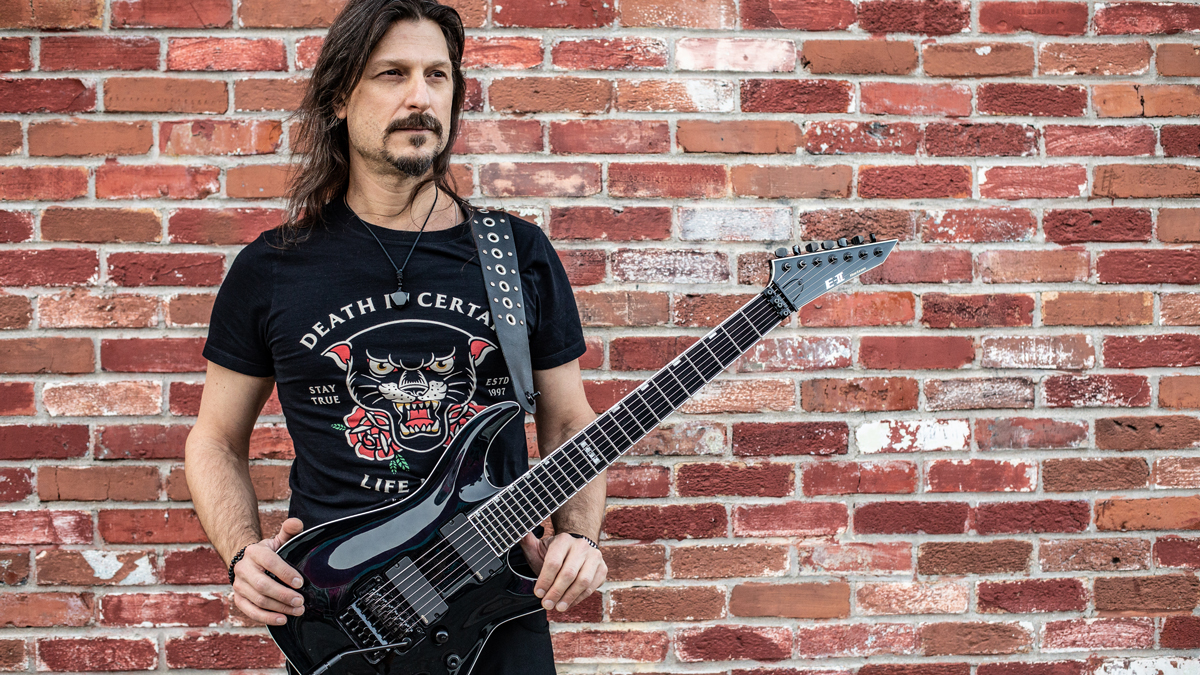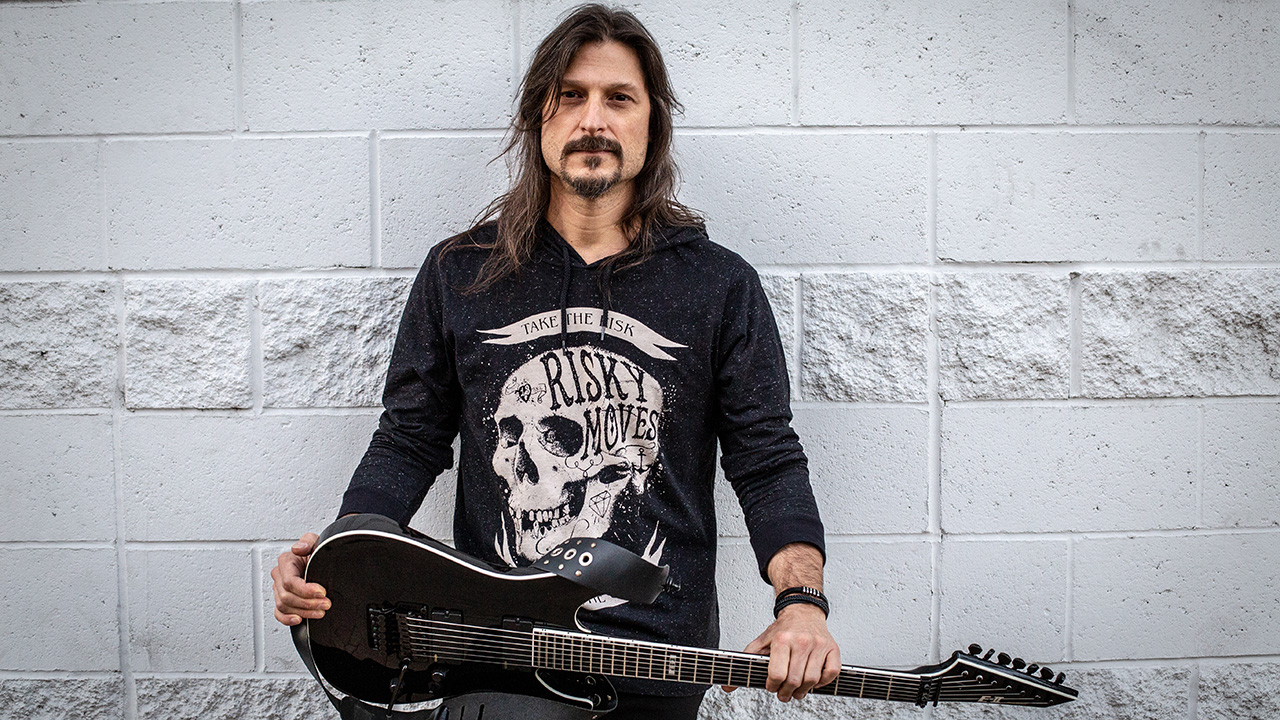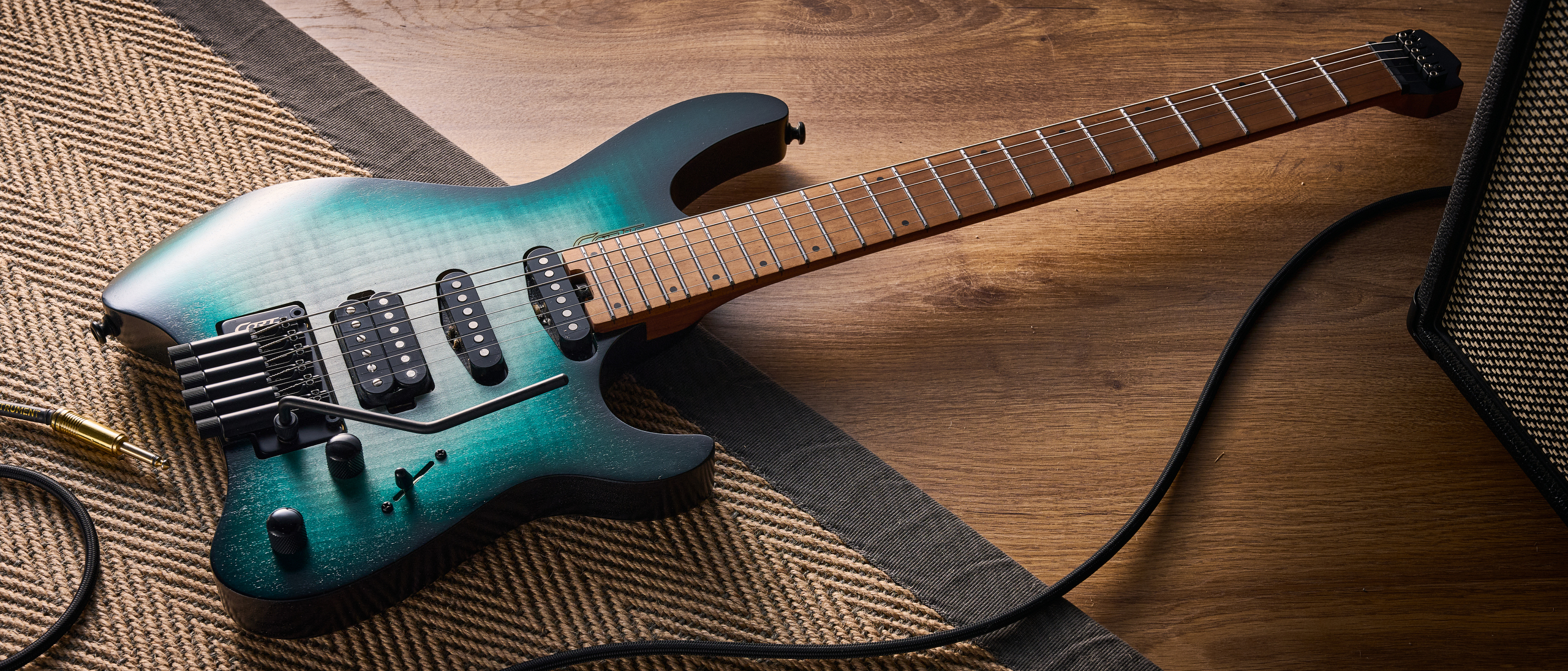“It was the last years of the dictatorship and imports were prohibited, so my first guitar was awful and my amp was my stereo system”: Angra’s Rafael Bittencourt had humble gear beginnings – but they inspired one of prog metal’s most dependable players
The Brazilian prog powerhouse is delighted with the emotion of latest album Cycles of Pain, but he laments the lack of string-bending in modern solos – and he’ll never forget the home-made dirt pedal that’s left him hating all fuzz effects

All the latest guitar news, interviews, lessons, reviews, deals and more, direct to your inbox!
You are now subscribed
Your newsletter sign-up was successful
Since 1991, Brazilian progressive-meets-power metal outfit Angra has delivered devastating swells of neoclassical riffage akin to a kick to the chest. For the band’s first 23 years Rafael Bittencourt, lined up with fellow six-stringer Kiko Loureiro, until Loureiro left in 2015 to join Megadeth.
Loureiro announced his departure from Dave Mustaine’s band in November 2023, after a leave of absence. While the band’s statements seem to leave the door open for a return, recent comments from Loureiro himself appear to make that unlikely. But you shouldn’t expect a return to Angra, either.
Despite remaining friends with his ex-bandmate, Bittencourt says: “It would make no sense. It would probably look like a downgrade for him. If Kiko decides to go free, he will probably enjoy his freedom for a while. And that's more than deserved. He’ll probably work on his solo and personal projects.”
Meanwhile, Bittencourt has a new Angra record to promote in the form of Cycles of Pain. “This is our 10th studio album and the third with Fabio Lione,” he says. “We’ve been around for over 32 years, and I think this is the most mature work we’ve ever done.
“It is very personal and emotional. The title is Cycles of Pain because it deals with the fact that although we avoid pain, seeking comfort and pleasure, pain will find us – and help us to grow stronger.”
Which track on the album holds the most meaning?
“Faithless Sanctuary sticks out for the intense combination of Brazilian elements and thrash metal. And Ride into the Storm is an epic power metal song with different dynamics and atmospheres. The title song is akin to a very emotional ballad.
All the latest guitar news, interviews, lessons, reviews, deals and more, direct to your inbox!
“Also, the song Tears of Blood is a duet between Fabio and the American singer Amanda Somerville, where Fabio is the killer of his beloved one, and Amanda is the spirit of the dead coming back to haunt him as the personification of his guilt.”
Which song do you feel best demonstrates Angra’s classic progressive metal sound?
“The Tide of Changes is a beautiful, progressive rock song. And then Vida Seca is significantly influenced by Brazilian music and features Osvaldo Lenine Macedo Pimentel, a famous Brazilian artist. And Gods of the World is a power metal song written over a 7/4 guitar riff.”
Which songs best represent the player you are today?
“On Ride into the Storm, I had to pick a 175bpm rhythm that needed a lot of preparation. In the solo for Here in Now, I played tappings with open strings over a very jazzy harmony and a very melodic solo that I’m very proud of.
“And the guitar riff for Gods of the World combines the odd measures from progressive metal and the traditional power metal riffs. I also love the solo for Vida Seca because it sounds melodic and technical at the same time.”
Which influences from growing up as a youth in Brazil impact you most?
“I have been very much into music since early childhood. At nine years old, I fell in love with Queen and Brian May. But it was was Angus Young from AC/DC who made me pick up the guitar. That wild and rebellious performance blew my mind, and I knew I wanted to be a guitar player like him.”
Are those players still apparent in your style?
“Yes. But when I started to play in the '80s, Eddie Van Halen, the guys from Iron Maiden, Ritchie Blackmore, Randy Rhoads, Yngwie Malmsteen and Steve Vai were my heroes. I’m also very much into David Gilmour. I still hear them all in my sound. I like the classic way of guitar playing, full of attitude and pentatonic licks.
“But as a songwriter, I’m significantly influenced by progressive rock bands such as Genesis, Rush, Pink Floyd, Jethro Tull and many others. I’m also very much influenced by lots of Brazilian acoustic guitar players. I love to hear the way they harmonize melodies here in Brazil. That’s why my music is more progressive power rock combined with Brazilian and classical music.”

What gear most defined you early on?
“When I started to learn the guitar during the ‘80s in Brazil, it was tough to find good gear. It was the last years of the dictatorship, and imports were prohibited. So my first guitar was awful, made In Brazil, and had poor technology and components. That taught me that we shouldn’t give up because of difficulties, but also that we need a good rig to develop to a high standard professional level.”
Was your amp equally as challenged?
“My guitar amp was my stereo system! I had to adapt a cable to be able to connect. I had stereo RCA plugs in one end and a normal guitar plug in the other. I also had a homemade distortion pedal that sounded kind of like a fuzz pedal. It was hard to get the feeling of a guitar sound. I still hate the sound of fuzz pedals because of that!”
As I understand it, you do a lot of writing on acoustic before recording. Has that always been the case?
“When I was young, most of the time I practiced on the acoustic guitar, and that’s where I learned the geometry of music and the instrument. I still write songs on the acoustic because it usually feels much more like home than the electric.”
These days you’ve got several great electric guitars, too. Can you remember your first pro setup?
“My first professional rig was a red Charvel by Jackson with a Floyd Rose. And I had a Peavey Rock Master tube amplifier, along with a Boss ME-5 multi-effect pedal. This was back in 1988; I had the chance to finish high school in America, and I spent all the money that my father gave me on that gear! I learned how to operate multi-effects, and I fell in love with the punchy sound of tubes, and it was nice to play on a comfier fretboard.”
Are you still using any of that gear?
“I have a different setup now – I love the sound of tube amplifiers such as a Marshall JCM800, 900, Dual Rectifier, Soldano, and many others. But I travel with my Kemper Profiler now, which delivers many of these sounds but is a much handier solution.”
What guitars are you primarily using now?
“Most of the rhythm guitar parts were recorded on the Ibanez RGD61ALET with a Fishman pickup and an Evertune bridge. We also added some rhythms from my Gibson Standard Les Paul and a Fender Strat that we had in the studio.
“I basically used three guitars to play my solos: my ESP Les Paul lookalike, my Gibson Les Paul and my Custom Shop Music Maker, a Brazilian brand of guitar.”
How do you view the way you play today versus the past?
“Today I’m much more intimate with the electric guitar. I have my own way of seeing it and playing it. So I’m much more confident in the way I play – I focus on perfecting my comfort zone and making good music out of it.
“But before, I would constantly be pursuing techniques beyond my limits, which was a waste of time when I needed to write an album that people would like to hear! I’ve learned it’s hard to sound honest through music if you're uncomfortable playing it.”
How does that mindset affect how you approach riffs?
I love bends because they’re physical and emotional. It used to be that you could tell who was playing by their string-bending… but it’s more about quantity than quality now. People have more resources with much less depth
“Riffs are about rhythm. There are three main elements in music: rhythm, harmony, and melody. A good guitar riff may contain a little of each, but I always look for an interesting rhythm to start with.”
How do you view guitar solos? Do you err toward indulgence or restraint?
“I prefer guitar solos from the style of the ‘80s and early ‘90s. I’ve noticed that many shredders now don’t bend strings, but I love bends because they’re physical and emotional. It used to be that you could tell who was playing by their string-bending.
“But not so much anymore – It’s more about quantity than quality now. People have more resources with much less depth. I believe instruments and techniques have evolved impressively, but people’s lives are much vainer and emptier.”
With Cycles of Pain out, what are your most immediate goals?
“First and foremost, to arrange my professional and personal life in a balanced way. I want to go on tour with Angra to promote the album, but I want to finish the tour while still having my wife there for me. I want my partners in my YouTube channel there, too. That will be an outstanding achievement.”
Album aside, what’s next?
“Angra has recorded a live acoustic session, and we want to release it next year. We’ll be touring for the next three years, and I hope life will stay manageable during the process. In the longterm, I hope to stop for a few years and study music again, write songs, write books, and record music in a more solitary and experimental way.”
- Cycles of Pain is out now via Atomic Fire Records.
Andrew Daly is an iced-coffee-addicted, oddball Telecaster-playing, alfredo pasta-loving journalist from Long Island, NY, who, in addition to being a contributing writer for Guitar World, scribes for Bass Player, Guitar Player, Guitarist, and MusicRadar. Andrew has interviewed favorites like Ace Frehley, Johnny Marr, Vito Bratta, Bruce Kulick, Joe Perry, Brad Whitford, Tom Morello, Rich Robinson, and Paul Stanley, while his all-time favorite (rhythm player), Keith Richards, continues to elude him.






